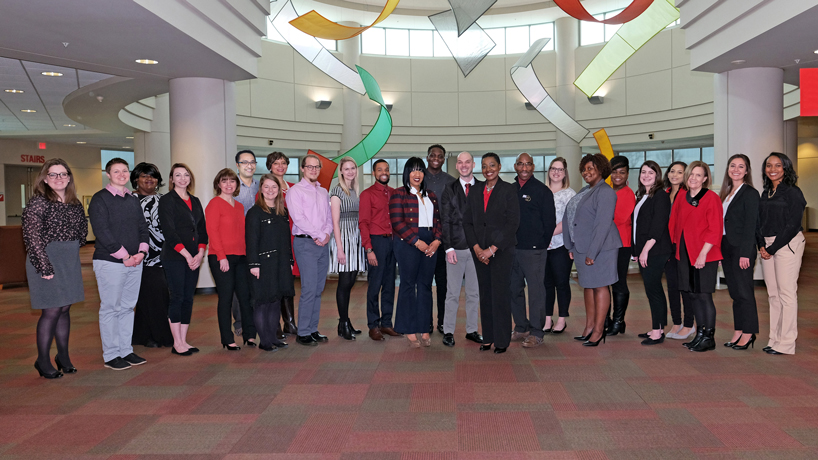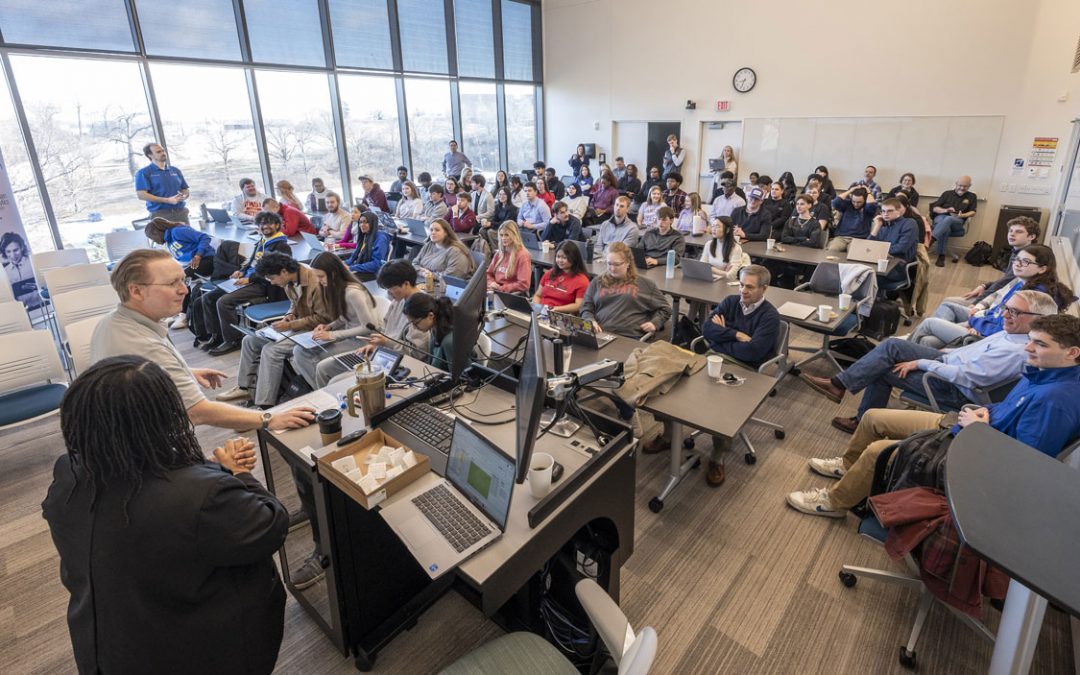
The Student Academic Support Services unit has altered its operations to continue serving the needs of students while they’re away from campus. (Photo by August Jennewein)
The location of the Student Academic Support Services unit is on the second floor of the Millennium Student Center rotunda in normal times provides easy access for University of Missouri–St. Louis students to find help while pursuing their studies.
The unit is home to Student Enrichment and Achievement, which provides targeted support and workshops for students facing academic challenges.
It also houses the University Tutoring Center, which helps equip students with effective study skills, strategies and resources to enhance their learning experience, and Multicultural Student Services, which provides comprehensive support through academic coaching, professional development, mentoring and Commit to Success.
With the COVID-19 pandemic forcing students to stay away from campus, Assistant Provost for Access and Academic Support Natissia Small and her team have been challenged to make sure that students can still connect with them and get the support they need.
“We want all students to know that we remain here for them with effective support systems and resources in place,” Small said. “Meeting student demand and needs while maintaining effective college access and academic support services for the campus and community is our focus. The transition to remote support was a unified effort that we knew was critical to ensure students remained engaged and supported.”
SASS has made adjustments to offer its services remotely.
Both SEA and MSS staff members are connecting with students either by phone or virtually to provide academic coaching and workshops.
The tutoring center has overhauled its operations, using the week before Spring Break to train all 55 of its student tutors, 20 student success grant tutors and 14 alumni tutors – all of whom had been working face-to-face – to conduct sessions via Zoom conference.
The center also sped up plans for unveiling a new online learning space for academic support and student services that it’s branded Triton Online Tutoring. It’s an enhancement of NetTutor, which provides access to tutoring help from across the country virtually.
Triton Online Tutoring offers help in eight math courses, 18 biology courses, 10 chemistry courses and 11 psychology courses through the new program.
“This is another area where it was imperative that we continued to provide walk-in tutoring to accommodate student need,” Small said. “We did not disband walk-in tutoring. In fact, it has been converted to what is now called ‘drop-in’ sessions, so students are able to look online at the UTC webpage and see available sessions.”
Small said students will also be able to benefit from “drop-in” sessions on Saturdays and Sundays beginning April 18.”
The tutoring center is coordinating study halls on Mondays from 2 to 10 p.m. Tutors will have a variety of different Zoom sessions where students can meet, discuss course material and get on-the-spot-tutoring assistance.
Small believes it’s as important to help students stay connected with one another as well as connected to faculty and staff.
Her team is also continuing to hold Commit to Success Workshops online with upcoming sessions that are specific to addressing remote learning challenges as well as topics such as networking, time management for online courses, work life balance, socio-emotional well-being, and professional development among other topics.
Those workshops typically start to wind down in the latter half of April, but the Multicultural Student Services and Student Enrichment and Achievement teams have filled the calendar into May to provide students with extra support to assist with remote learning.
“Kudos to the entire SASS leadership team and staff for the hard work conducted collaboratively to implement all of these changes in a short amount of time,” Small said. “Our support services may look differently, but our commitment to student success remain the same.”
Small also oversees UMSL’s Precollegiate Student Services, and they too have made changes to continue to cater to the needs of high school students.
The Bridge Program’s “Bridge to the ACT” Summer Intensive will now be offered online with two one-week sessions. It will still provide rising high school juniors students with in-depth sectional analysis and tactical learning approaches that will help manage the stress associated with taking the ACT.
Small, Bridge Program Director Channon Peoples and the rest of their team have been preparing to move the Summer Academy to an online format as well.
The Summer Academy typically brings more than 250 high school students to campus each summer, from mid June to mid July, for academic enrichment courses in mathematics, science, written and oral communication as well as career research, personal and professional development and activities that support college planning.
“We have an exceptional caliber of high school teachers that capable of instructing virtually, it will be another major overhaul but we are ready for the challenge,” Small said. “Bridge remains committed to promoting college readiness and matriculation in whatever mode necessary to support the college bound student.”














